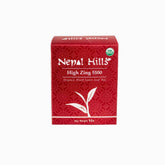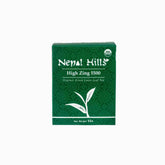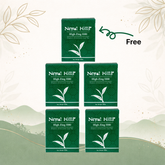Nutrients and Health Benefits of Tea
Unlocking the Secrets of Tea: A Deep Dive into Nutrients and Health Benefits
Black Tea: The Bold Nutrient Powerhouse
Black tea, with its robust flavor and deep amber color, is created through a complete oxidation process that transforms the tea leaves and their chemical composition. This traditional favorite isn't just a morning pick-me-up – it's a rich source of various beneficial compounds.
Key nutrients in black tea include:
- Theaflavins and Thearubigins: These unique flavonoids are formed during the oxidation process and give black tea its characteristic color and taste. Research suggests they may help reduce inflammation and support heart health by improving blood vessel function.
- Caffeine Content: Black tea typically contains 14-70 mg of caffeine per 8 oz cup, providing sustained energy without the jitters often associated with coffee. The caffeine in black tea forms a unique compound with L-theanine that promotes both alertness and calm focus.
- Amino Acids: The L-theanine in black tea has been shown to promote alpha brain wave activity, potentially reducing anxiety while improving focus and creativity.
- Polyphenols: These powerful antioxidants help protect cells from DNA damage and may reduce the risk of chronic diseases. Black tea is particularly rich in polyphenols that have been linked to improved gut health and reduced inflammation.
Green Tea: Nature's Antioxidant Treasury
Green tea, minimally processed and rich in natural compounds, has been at the center of numerous scientific studies for its exceptional health benefits. Its unique processing method preserves delicate compounds that would otherwise be transformed during oxidation.
-
Catechins: The star compound EGCG (epigallocatechin gallate) is the most abundant and studied catechin in green tea. Research suggests it may:
- Boost metabolism and aid in fat burning
- Protect brain cells from oxidative stress
- Support cardiovascular health
- Help regulate blood sugar levels
-
L-theanine: This unique amino acid crosses the blood-brain barrier and may:
- Promote relaxation without drowsiness
- Improve sleep quality
- Enhance cognitive performance when combined with caffeine
-
Vitamins and Minerals: Green tea contains:
- Vitamin C for immune support
- Vitamin B complex for energy metabolism
- Trace minerals including zinc, selenium, and manganese
White Tea: The Delicate Nutrient Preservative
White tea, the least processed of all teas, retains the highest levels of certain antioxidants and natural compounds. Harvested from young buds and select leaves, it undergoes minimal processing to preserve its delicate nature.
-
Antioxidant Content: White tea contains the highest concentration of certain antioxidants among all tea types, including:
- Catechins (higher levels than green tea)
- Polyphenols
- Flavonoids
-
Anti-aging Compounds: Research suggests white tea may:
- Protect collagen and elastin in the skin
- Fight free radicals that cause premature aging
- Support cellular repair mechanisms
-
Unique Compounds: White tea contains rare compounds that are often destroyed in more processed teas, including:
- EGCG in its most natural form
- Theanine at higher concentrations
- Unique flavor compounds that contribute to its subtle taste
Oolong Tea: The Balanced Nutrient Spectrum
Oolong tea, with its partial oxidation, creates a unique profile of nutrients that combines elements of both green and black teas. This processing method results in a complex array of beneficial compounds.
-
Unique Polyphenols: Oolong contains:
- Theaflavins from partial oxidation
- Catechins preserved from minimal processing
- Unique compounds formed during its specialized production
-
Metabolism-Boosting Compounds: Studies suggest oolong tea may:
- Support healthy weight management
- Enhance fat oxidation
- Help maintain healthy blood sugar levels
-
Mineral Content: Oolong is particularly rich in:
- Manganese for bone health
- Potassium for heart function
- Magnesium for energy metabolism
The Comprehensive Health Benefits of Tea
Antioxidant Protection
Tea's diverse array of antioxidants provides comprehensive cellular protection. These compounds work synergistically to:
- Neutralize harmful free radicals
- Protect cellular DNA from damage
- Support the body's natural detoxification processes
- Promote healthy aging at the cellular level
Cognitive Enhancement
The unique combination of compounds in tea supports brain health through multiple mechanisms:
- L-theanine promotes alpha brain wave activity
- Caffeine enhances alertness and focus
- Antioxidants protect neural tissue
- Polyphenols support healthy brain aging
Cardiovascular Support
Regular tea consumption has been linked to improved heart health through:
- Better blood vessel function
- Reduced inflammation markers
- Improved cholesterol profiles
- Healthy blood pressure support
Immune System Enhancement
Tea provides comprehensive immune support through:
- Antioxidant protection against oxidative stress
- Anti-inflammatory compound action
- Support for healthy gut bacteria
- Enhanced production of immune cells





